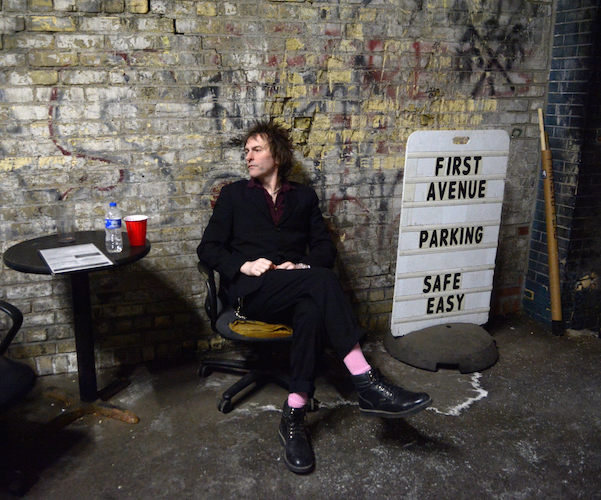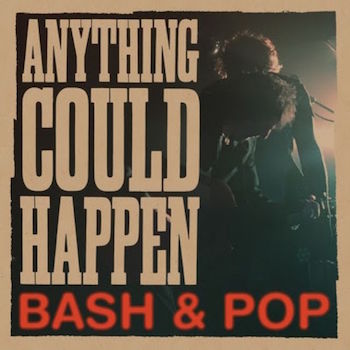Music Interview: Tommy Stinson — The Living Embodiment of Rock-and-Roll?
Anything Could Happen is a 12-song collection that is as good as anything that a fan could have hoped for from Tommy Stinson.

Tommy Stinson in 2016. Photo: Steven Cohen.
By Blake Maddux
In his book Trouble Boys: The True Story of The Replacements (click for my review), biographer Bob Mehr quotes legendary Memphis record producer Jim Dickinson as saying, ““People say Keith Richards is the living embodiment of rock-and-roll? I’m sorry, but I know Keith, and it’s Tommy.”
“Tommy” is Thomas Eugene Stinson. Born in 1966, he started learning the bass guitar at age 11 at the encouragement of his ill-fated six-string-strumming older brother, Bob.
Along with vocalist and songwriter Paul Westerberg and drummer Chris Mars, the Stinsons played on some of the most influential rock albums of the 1980s as members of The Replacements, the hard-partying Minneapolis quartet that helped mix the cement and pave the way for the alternative rock explosion of the next decade.
Following the dissolution of The Replacements in 1991, the younger Stinson founded a new band called Bash & Pop. This band released Friday Night is Killing Me in 1993 before falling apart itself shortly thereafter.
For the rest of the 1990s, Stinson would work as printer toner-selling telemarketer, recorded an EP and LP as a member of Perfect, and—in 1998—begin a 18-year trek of performing in front of the largest crowds of his career as a member of Guns N’ Roses. (He also released two solo albums and worked with fellow Minneapolitans Soul Asylum between 2004 and 2012.)
In 2015, The Replacements wrapped up a triumphant two-year series of reunion performances that included a headlining spot at 2014’s Boston Calling (click for Adam Ellsworth’s Arts Fuse review). Although the band did not deliver the new material that fans had long salivated at the possibility of, Stinson had written several songs in the spirit of the two-decade old Bash & Pop album and decided to record under that name again.
With a PledgeMusic campaign to support it, the result is Anything Could Happen, a 12-song collection that is as good as anything that a fan could have hoped for. Anything Could Happen will go on sale on January 20 and a vinyl reissue of Friday Night is Killing Me will be available the following week.
In the meantime, Stinson is already on tour with Bash & Pop, which this time around includes Steve “The Sleeve” Selvidge on guitar, Justin “Carl” Perkins on bass, and Andover, MA native and Mighty Mighty Bosstones drummer Joe “The Kid” Sirois.
Stinson spoke by phone to The Arts Fuse on the day after the tour opened in Minneapolis and in advance of its January 21 stop at Great Scott, Allston, MA.
Arts Fuse: Considering that there is a 24-year space that separates them, is Anything Could Happen a follow-up to Friday Night is Killing Me or is it an entity unto itself?
Tommy Stinson: You know, I do feel as though it’s more of a follow-up. I mean, we recorded this record live and in the fashion that I really wanted to do that first Bash & Pop record, although it didn’t quite turn out as live a record as we planned. The first one, anyway. So this one actually has more of a live rock ‘n’ roll band feel to it. And I really kinda wanted to make a record where I wasn’t wearing too many hats at once and I could actually, you know, capture some of the essence of a rock band playing live together in the studio.
AF: How did the people who play on Anything Could Happen end up doing so?
Stinson: It’s funny, I knew Joe Kid [drummer Joe Sirois] from L.A. when I lived out there. I knew of Steve Selvidge, who played in The Hold Steady, and all I really knew about him was that he came highly recommended from Luther Dickinson [son of Jim and member of North Mississippi Allstars] because they kind of grew up together. Pretty much two peas in a pod in a way. So that’s how I got him. And Tony Kieraldo, the keyboard player, he’s a buddy of mine in Hudson, NY. We always play together and do different things. And Justin Perkins is a buddy that helped mix and master my last record, or this record, I should say, and he’s helped me do some other things. He’s kind of my go-to guy for that thing, and he’s the only bass player I really know that actually plays similar to me, which is somewhat important when you’re playing bass on my stuff.
AF: Bob Mehr wrote in Trouble Boys, “If Paul Westerberg ever experienced anything like love at first sight in his life, it was the moment he laid eyes on Tommy Stinson.” What do you think of that?
Stinson: Um, pretty funny. It’s a little dramatic I’d say, you know?
AF: Having been nominated for the class of 2014 but not selected, is it important to you that The Replacements eventually become members of the Rock and Roll Hall of Fame?
Stinson: You know, I’ll be honest with you, I don’t really care about it. It seems to keep coming up and rearing its head every couple of years or whatever. It would be great if that happened I’m sure, but I don’t really ponder things of that nature with the Rock and Roll Hall of Fame. It seems a bit silly to me, actually.
AF: How would you have reacted if, when you first heard their 1987 debut Appetite for Destruction, someone told you that you would end up spending 18 years as a member of Guns N’ Roses?
Stinson: I probably woulda said, “You’re out of your fucking tree!” But lucky me, I got to do that for all those years. That was a fun gig.
AF: Would your reaction have been because Guns N’ Roses would not seem like the kind of band you would want to join or because you wouldn’t understand why they would hire you specifically?
Stinson: Either direction. I woulda thought, “What the hell would I do that for and why the fuck would they want me?”
AF: How would you compare and contrast Westerberg and Axl Rose as front men and what did you learn from them?

Stinson: You know, I learned a good deal from both of them. They’re not that dissimilar. They have a lot more in common than they don’t in terms of their artistry, you know, their temperament, things like this.
AF: What brought about your collaboration with electronic musician BT on the soundtrack to the 2007 movie Catch and Release?
Stinson: I knew BT for a while before that all happened. He was a buddy of mine and we had a lot of mutual musician friends. I had played with him on different projects of his or whatever. And the people at Sony really liked my stuff for this particular movie, but they needed to get somebody that actually had scored a movie to kind of partner up with me because I hadn’t done it before. They really wanted someone that knew that they were doing, and so they paired us up.
AF: Why did you decide to become an ordained minister in the Universal Life Church?
Stinson: Years ago my friends were getting married and they asked me if felt like marrying them. So we hooked up with the Universal Life Church thing and I was the one that administered their wedding vows to ‘em. It was a fun thing. Frank Black [The Pixies] came and sang some songs, and it was just a fun thing. All of us, all of our friends hanging out and stuff.
AF: How many other weddings have you officiated in that capacity?
Stinson: That’s the only one. The only one I’ve done so far. That’s why I put it on my pledge campaign, to see if I get any takers.
AF: Bob Dylan said in his Nobel Prize acceptance speech, “As a performer I’ve played for 50,000 people and I’ve played for 50 people and I can tell you that it is harder to play for 50 people. 50,000 people have a singular persona, not so with 50. Each person has an individual, separate identity, a world unto themselves. They can perceive things more clearly. Your honesty and how it relates to the depth of your talent is tried.” Can you relate?
Stinson: I’d say that’s a pretty accurate assessment. It makes sense to me. Lucky for him he doesn’t have to play for 50 people!
Blake Maddux is a freelance journalist who also contributes to The Somerville Times, DigBoston, Lynn Happens, and various Wicked Local publications on the North Shore. In 2013, he received an MLA from Harvard Extension School, which awarded him the Dean’s Prize for Outstanding Thesis in Journalism. A native Ohioan, he moved to Boston in 2002 and currently lives with his wife in Salem, Massachusetts.
Tagged: Anything Could Happen, Bash & Pop, Friday Night is Killing Me, The Replacements
